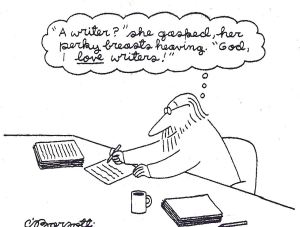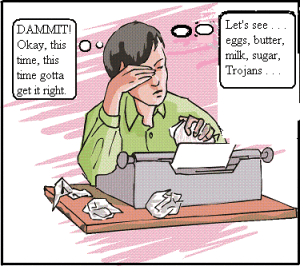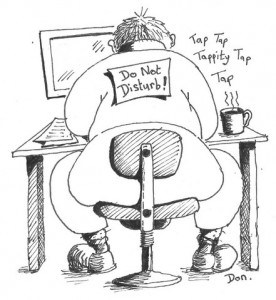 Have you ever met someone who seemed…well…cardboardish? You know what I’m talking about, stiff, boring and if they weren’t standing upright you would swear they might not have a pulse. What do you usually do when these folks are around? You leave right? You need to think about that when you are creating your characters.
Have you ever met someone who seemed…well…cardboardish? You know what I’m talking about, stiff, boring and if they weren’t standing upright you would swear they might not have a pulse. What do you usually do when these folks are around? You leave right? You need to think about that when you are creating your characters.
Despite what non-writers will tell you our characters are real people. They have to be or the whole story isn’t believable. You characters have to ring true and the only way for that to happen is to make them as “real” as possible and to do that you have to give your characters some character.
People are not one-dimensional. In fact most of us have some sort of split personality. I know that I am different with my peers than I am my spouse and my children know an entirely different side of me. This is not to say that all of these personalities don’t bleed together; they do but if I am honest I have many, many sides. People are complicated because there are so many sides to each of us. Your characters have to have this aspect of being as well. Your main character, for instance, has to have “things” that make him/her your main character. They have to be strong and resourceful. They also have to be interesting.
So what can you do to give your characters more character? You can….
- · Give him/her a backstory – Everyone needs history to work off of. Our history is what shapes us.
- · Make sure the personality fits the name – Bob will never be a super hero but Mika will. Think about what you name your characters; it’s important.
- · Give him/her issues – We all have them…those things that we drag around with us. Emotional baggage is very helpful when defining your characters. There has to be a reason why they do what they do.
- · Give him/her a physical trait – When describing folks to other folks we often hear things like, ‘she has a limp’ or ‘he has sleepy looking eyes’. “Real” people often have something that makes them stand out from others. Make your characters memorable by giving them a physical trait that makes them unique.
These are just a few things that you can do to give your characters character. Remember that you want readers to like your characters, relate to them or downright hate them…strong emotional reaction is a good thing. So write a more memorable story by making sure that your characters are as real as it gets.
© The Writer’s Advice, 2013. Unauthorized use and/or duplication of this material without express and written permission from this blog’s author and/or owner is strictly prohibited.
Like this:
Like Loading...
Tags: advice, author, book, Character, creation of character, inspiration, Inspire, Jai Colvin, Jai Farris, learning, novel, novelist, organization, organize, plot, structure, telling story, writers, writing, writing process, Writing tools
 We writers can take ourselves way too seriously. One of the most frustrating things as a young writer is to have those “seasoned” writers in your face touting the rules like they were the 10 commandments from the big guy himself. Yes there are some rules that you need not to break i.e. use commas and such but there are others that can be broken like the way you use tense and point of view. One of the worst “rules” ever; go over each thing you write at the end of the day. Here’s the really cool thing about being a writer…we “create” things, even the rules and when we create we get raw; trust me; you can’t do that if you are editing as you write.
We writers can take ourselves way too seriously. One of the most frustrating things as a young writer is to have those “seasoned” writers in your face touting the rules like they were the 10 commandments from the big guy himself. Yes there are some rules that you need not to break i.e. use commas and such but there are others that can be broken like the way you use tense and point of view. One of the worst “rules” ever; go over each thing you write at the end of the day. Here’s the really cool thing about being a writer…we “create” things, even the rules and when we create we get raw; trust me; you can’t do that if you are editing as you write.
When I am working on a book I always write through the first draft without my internal editor. I ignore spelling, tense rules and all that crap that the editing process is supposed to involve. The first go round is to just write the darn story down. Have you ever woken from a dream and thought to yourself, “I need to write that down before I lose it”…writing should be viewed the same way during the first draft stage. You have to get the story down and then go back and on your re-read decide what needs to be changed or dumped. I find that if I don’t do this I lose a lot of the “passion” I had for a story. Just like that dream, if you don’t get it down, you just might lose it.
Stories are emotional vessels for both the writer and the reader. It is a way to convey a piece of the world that either didn’t exist before or to share how that story is seen through your eyes. Emotion is here and now, it’s raw and bold…it is not edited and forced which is what you will do if you try to both write and edit the first time around. Have you ever told a story, verbally, and had your audience on the edge of their seats and then later tried to retell the story only to discover that it doesn’t sound the same? That’s because you are merely repeating the story the second time around; you were creating it the first time around.
So stop trying to edit as you go, it makes about as much sense as combing you hair after each snip of the barber’s scissors; it wastes time and there is no way you can envision the whole story if you are picking it apart as you go. Get it down, get it raw and then go back and put clothes on it.
© The Writer’s Advice, 2013. Unauthorized use and/or duplication of this material without express and written permission from this blog’s author and/or owner is strictly prohibited.
Like this:
Like Loading...
Tags: advice, book, Character, creation of character, editing, editor, emotion, inspiration, Inspire, Jai Colvin, Jai Farris, novelist, raw writing, structure, telling story, writer, writing, writing job, writing process, writing raw, Writing tools

There are some perks to being a writer. For instance, I can kill off people I don’t like or who slight me. I can live anywhere in the world and the plane ticket doesn’t cost me a cent. I can be an expert at any number of things including cool stuff like bomb disposal and international spy. I can be good at anything I put my pen to…AND I can be the lead in any story I choose.
I think that we writers are lucky because we get to create worlds at will. I can sit down at my desk and create a whole world where the possibilities are endless. Sure I need to make those worlds believable because I don’t want to lose my readers but with just the right amount of detail, I can make the reader believe just about anything.
I think of writing as sort of a therapy most days. If you read my books (and I think everyone should) your will discover that, over the years, I have worked out quite a few things through the pen and paper. I have dealt with child abuse, bad marriages and relationships, death, my feelings of insecurity and even redecorating my office, all through stories. I have also dealt with not having been one of the pretty people in the world.
In high school I was the clown. I was the one who made everyone laugh and so I was accepted into just about every group of people that populated the school yard. One thing I was not however was the charming, always-know-what-to-say, good-looking guy that the girls fawned over. I was charming enough but I was also “funny” and you know what happens to the funny folks, they are forever stuck in the “friend zone” when it comes to dating. That was me…always the friend never the one with filled Saturday nights; being a writer changed all that for me though and now…well…folks think I’m pretty cool both within my stories and in the real world.
Writing can be a lonely occupation but it is also what you make of it. Writing should open up the world to you in such a way that you don’t have to feel like the wallflower any more. You can get the girl and so much more. So I said all of that to say this…realize that writing has it’s perks and that no other job in the world can make you feel like you can have it all with the exception of writing. Use the story pages to work out your life…it’s okay…working things out gives your writing that human element that draws readers into your story. Don’t be scared to pour your emotion onto the page…use that emotion, wield it like a sword fighting your way off the wall at the school dance to become the leading guy. It’s one of the perks after all…it’s your story and it can go anywhere you want it too.
© The Writer’s Advice, 2013. Unauthorized use and/or duplication of this material without express and written permission from this blog’s author and/or owner is strictly prohibited.
Like this:
Like Loading...
Tags: advice, author, book, Character, creation of character, inspiration, Inspire, Jai Colvin, Jai Farris, learning, novel, novelist, pen, plot, relevant, showing and telling, structure, telling story, writer, writers, writing, writing job, writing process, Writing tools
 My mom is almost 70 years old. For most of her life there were no computers, e-mail, Facebook or any of the other technical advances that our generation was born into. When someone needed to get ahold of you they called the “house phone” and hopefully your brother or sister was not on the phone at the time or the caller would get a busy signal and have to “wait” until the phone was free. (Don’t think for a second that “call waiting” changed that because we all learned to ignore the beeping in our ear when someone else tried to call in) And when someone needed to have an actual conversation they had to actually meet face to face for lack of texting, blogging or IM-ing. For folks like my mom technology is both good and bad for all sorts of reasons.
My mom is almost 70 years old. For most of her life there were no computers, e-mail, Facebook or any of the other technical advances that our generation was born into. When someone needed to get ahold of you they called the “house phone” and hopefully your brother or sister was not on the phone at the time or the caller would get a busy signal and have to “wait” until the phone was free. (Don’t think for a second that “call waiting” changed that because we all learned to ignore the beeping in our ear when someone else tried to call in) And when someone needed to have an actual conversation they had to actually meet face to face for lack of texting, blogging or IM-ing. For folks like my mom technology is both good and bad for all sorts of reasons.
When Mom discovered e-mail and Facebooking she waded into it with the caution of a bomb disposal team. She started by texting “hi” and waiting for a response and then she graduated on to actual sentences. Now, she over texts, meaning that often, while having a conversation with her, she will actually talk over me by texting before I can answer her first question. But perhaps the most annoying thing that my Mom does, and no one can seem to make her stop, is messaging in all caps.
I don’t know what it is about my Mom’s generation but they all text in caps at some point. Does my Mom realize that it makes me feel like she is yelling at me? She probably doesn’t. Does she realize that texting in caps conveys a tone? Nope, I’m pretty sure she doesn’t get that either…but I do and therein lay the point of this column. As writers we have to watch our tone.
We can convey a “tone” with the way we write. My Mom does with her all caps but writers do it also in various ways. Tone can be found in the way a character speaks or in the actions he/she takes. Often times we can change a characters tone and never even realize it until someone else points it out. My spouse and I have a long running conversation going on about the “tone” I often take with our kids…I say things like, “that’s not what I mean” or “they misunderstand” a lot when if I just listened to my spouse I would realize that often what I say comes out in a tone that does not convey my true emotion. This can easily happen within your writing too.
So remember…when you are building those characters or giving them dialog watch your (or rather their) tone within the story. You don’t want your characters or your story misunderstood.
© The Writer’s Advice, 2013. Unauthorized use and/or duplication of this material without express and written permission from this blog’s author and/or owner is strictly prohibited.
Like this:
Like Loading...
Tags: advice, author, book, Character, creation of character, editing, editor, inspiration, Inspire, Jai Colvin, Jai Farris, learning, novel, novelist, organization, organize, showing and telling, structure, telling story, writer, writers, writing, writing process, Writing tools

Have you ever written something only to go back over it like 900 times and rewrite it every way imaginable? I do it all the time. I have been known to even do it when writing something as simple as a list or a note for my daughters’ school. One of the reasons why is because, as a writer, I don’t want other people to read something I have written and say to themselves, “This guy is a writer…really?” Another reason is because I have a compulsion to make everything I write as clear as possible; no misunderstandings here. Perhaps the most important reason though is because I over think absolutely everything…including my writing.
Over thinking our work is a condition that is an ailment within the writing community. Like any disease it invades writing groups across the nation and makes us all question our work and then rework it until it is a fraction of the idea we began with. It can start with something as simple as a character and a single trait. Does Bill really walk with a limp? Why should I give him a limp? What if he has to run later? What if he dies all because I gave him a stupid limp? Do you see what has happened there? My obsession over Bill’s limp has stopped all story flow. I could feasibly spend hours, even days, on Bill’s limp.
Over thinking your story can keep you from ever finishing it at all. It is for this reason that many seasoned writers will tell you to write your first draft completely through before even really “thinking” about the story at all. I think this is great advice but it does not stop the possibility of over thinking; it just delays it. Now you have your finished first draft but if you are an over thinker you will just do it on the first edit. The key to not over thinking is to not do it at all.
Let’s call it what it is…over thinking is the byproduct of low writing self-esteem. Those of us who over think are not actually over thinking the story but instead we are over thinking ourselves. We need to recognize what is happening in order to correct it. We are not actually questioning the story but our own ability to write the story. It is not unusual to self-doubt as a writer…it is a lonely way to work and often times we don’t get positive feedback and when that happens it is easy for our minds to run amuck. You have to stay on top of how you are feeling about your writing and if need be, you must do all you can to boost your self-confidence. I have a friend who I can call if I am going through it. We boost each other out of the mire of self-doubt. I know that if I don’t deal with it, the story I am working on will never get finished.
So find a friend, be aware of what is really going on and fight self-doubt head-on. If you don’t you will never finish your story and all you will end up with is a guy with a limp and nowhere to go.
© The Writer’s Advice, 2013. Unauthorized use and/or duplication of this material without express and written permission from this blog’s author and/or owner is strictly prohibited.
Like this:
Like Loading...
Tags: advice, author, book, Character, creation of character, editing, editor, inspiration, Inspire, Jai Colvin, Jai Farris, learning, novel, novelist, structure, telling story, writer, writers, writing, writing process, Writing tools

I hate to be interrupted when I am killing folks. Nothing is more annoying than when, in the middle of offing someone, the kids come in and bug me. Seriously…don’t they realize how hard it is to kill a person?
On the one hand, I hope my kids never learn how hard it is to kill someone unless that is; they are a writer like me. One the other hand, I do wish that those around me would realize that when I am in the mode or the moment, I really need to be left alone. I live in a household with kids who have been raised to talk all the time. I was a newspaper reporter for a long time and needless to say they get their excessive need to vocalize constantly from me and, trust me, I am paying for it now.
It is really important to set boundaries when you are a writer. First, you work from home so to most folks in the family that mean easy access. Second, you are “just typing” after all, so the concept of interrupting is not as foreign as say if you were a bomb maker. (No one wants to bug that guy for some reason) And finally, because there is no way for a person who does not write to truly understand the process, well, folks just kind of sluff it off. “You aren’t really doing anything important…”
So how does a writer set these very important boundaries? Truth be told it depends on the age of your kids. If you have toddlers you can’t very well slam the door in their faces so with them set a time to write during nap time or after they go to bed at night. With teens, they get it so just simply make the rules known and then enforce them. Set your writing time and then declare it off limits. As for your spouse, they married you so they knew what they were getting into, just talk to them, they will understand. And if that doesn’t work, the next time they are taking a nice relaxing bath, go into the bathroom and go potty….this will reinforce the need for privacy, trust me.
As a writer you have to have time to write uninterrupted. Most of us either work from home or we are fitting our writing in during the time we are off the “real” job…this demands some periods of writing that can be done so that the stream of your scenes and story flow uninterrupted. So don’t be shy, demand that folks adhere to your boundaries and if they don’t there is always that bathroom thing which just may work on the teenaged kids too.
© The Writer’s Advice, 2013. Unauthorized use and/or duplication of this material without express and written permission from this blog’s author and/or owner is strictly prohibited.
Like this:
Like Loading...
Tags: advice, author, book, boundaries, Character, creation of character, family, inspiration, Inspire, Jai Farris, kids, killing, learning, novel, novelist, pen, Point of View, story, teenagers, telling story, writer, writers, writing, writing process, Writing tools

Creating characters is fun. I know that personally there are times when I get all excited because the writing is really flowing and I start over creating characters. Over creating? Yep, I start over crowding my story and you can no longer truly see the story, much like the train in the photo above.
Sometimes a story can appear to require a lot of people to support it. We have all read that epic novel that has a gazillion characters in it and seems to work well but the truth is those are rare. A story that can carry all those characters has to be epic and long and, well, extraordinary; most of us don’t do extraordinary on a regular basis. So what is a writer to do when they are pecking along on the keyboard and suddenly realize that there are way too many people in their story?
- Decide who the story revolves around – The first thing a writer needs to do when they discover an overabundance of characters is determine who the story is about. It sounds easy enough however sometimes it can be tricky. Your main character is the center of your writing universe. Determine who that is; it’s key to figuring out who you need.
- Cut all the fluff – We all tend to add in characters that really don’t have anything important to do in the story. I once added a woman into one of mine just because the character sounded cool. Turns out she was a character for a whole different story.
- Create your main character’s universe – This is where mapping software is cool. Center your main character and then branch out all the character’s connections. You will end up with the universe of your story.
These are just a few suggestions, I’m sure that some of you have more. The bottom line is that if your story is crowded it will be tough for your readers to see the actual story. Extra characters are a distraction for both you as a writer and for your reader. If you cut the characters correctly what you will end up with is a full-bodied story with characters who feel like they belong.
© The Writer’s Advice, 2013. Unauthorized use and/or duplication of this material without express and written permission from this blog’s author and/or owner is strictly prohibited.
Like this:
Like Loading...
Tags: advice, author, book, Character, creation of character, inspiration, Inspire, Jai Farris, learning, novel, novelist, organization, plot, Point of View, writer, writing process, Writing tools

I have had many, many discussions (ahem, arguments) over the years about tone. When I was younger my best friend used to say that I spoke in a certain “tone” when I was irritated and I would argue that I didn’t have a “tone”. For me a “tone” was a nasty inflection in one’s voice, as in my mom saying, “don’t take that tone with me” but now I know better. Now I know that a “tone” is so much more.
As a writer you have to actively set the tone for any story, short or otherwise. The reader needs a sense of what the mood of your story is. Setting the tone might be the way a character communicates or how a character sees the world around them. Sure it still describes how one might speak to another but when it comes to writing “tone” is part of the skeleton of your story.
How effective can tone be? Case in point….text messages. I often get responses from my better half telling me that they can tell how I feel about something by my “tone” in my text. A text…. At first I thought this was ridiculous. How could someone tell by a text message what my “tone” is? But the more I paid attention to how I was feeling when sending certain text messages I realized that they were right…I did have a tone.
A lot of readers will tell you that they didn’t like this book or that but can’t tell you why…my guess is the tone. If you need proof of tone in your own writing, slap it into a text reader and listen. Most text readers are fairly monotone but if you really listen, you will hear the tone still coming through. I started doing this recently and it helps. (It also helps to show you where certain scenes aren’t working)
So while you are laying the groundwork for your next story, don’t forget the tone. It may been silly to worry about it but in the end you will see that setting the right tone just might be half the battle.
© The Writer’s Advice, 2013. Unauthorized use and/or duplication of this material without express and written permission from this blog’s author and/or owner is strictly prohibited.
Like this:
Like Loading...
Tags: advice, author, book, Character, inspiration, Inspire, Jai Farris, learning, novel, novelist, organize, setting the tone, story, structure, telling story, tone, writer, writers, writing, writing process, Writing tools
 This morning I had a meeting set for 10 a.m. at the Barnes and Noble nearby. As I sat waiting for the guy I was supposed to meet I got the chance to sit and watch the comings and goings of the patrons of this particular coffee cafe…I have to say, it was interesting for me as a human as well as a writer.
This morning I had a meeting set for 10 a.m. at the Barnes and Noble nearby. As I sat waiting for the guy I was supposed to meet I got the chance to sit and watch the comings and goings of the patrons of this particular coffee cafe…I have to say, it was interesting for me as a human as well as a writer.
In streamed a seemingly endlessly array of those looking for something. There was one guy who was obviously trying to feel a bit more important than his “real” life allowed. You could tell because he came in, ordered a large coffee and then stared the room down as though he was daring someone to question him on why he was here. Then there was the older couple who sort of slinked in and quietly set up their laptop at a near by table looking as if they had just stolen the laptop….they were here for the free WiFi. And there was OCD guy who walked in, ordered a very specific coffee - latte, soy, half an extra shot and only two pumps of chocolate, about 180 degrees - he then laid his stuff out on a table by the window setting each thing down one piece at a time, each in it’s own spot. After arranging his stuff he then tried first one side of the table and then the other obviously looking for just the right lighting. He made me tired by the time he settled in and I had to fight the urge to walk over and mess up his stuff just to see what he would do.
I could go on, lord knows there were many, many others but that’s not the reason for today’s column. (Although it would have been entertaining) I described the patrons of the Barnes and Noble cafe to show you just how much material is in a trip outside of the house. If you are anything like me, and most writers are, we live a bit of a mushroom type of life. We stay at home, chained to our desk ignoring the rest of the world in the name of getting down one more page….we have to stop doing that. You have to live in order to be able to write about life. Let me say that again….you have to live, in order to write about life.
So take that trip, travel to places you have never been, head down to the nearest mall and people watch…it’s all research and it can be invaluable. In fact, the above B & N scene is going to make it into one of my books….it’s too full of characters not to.
© The Writer’s Advice, 2012. Unauthorized use and/or duplication of this material without express and written permission from this blog’s author and/or owner is strictly prohibited.
Like this:
Like Loading...
Tags: author, book, Character, creation of character, inspiration, Inspire, Jai Farris, learning, novel, novelist, writer, writers, writing, writing process, Writing tools
 Writer’s Note - Reset Sunday will be back this week so watch for it….
Writer’s Note - Reset Sunday will be back this week so watch for it….
This is one of the problems most writers face within the first couple of manuscripts they produce…the “he said/she said” problem. Now most of you are wondering if this is a column about dialogue and it is but it is more to the point about “saying”…
We have all read those books where the author feels the need to tell you who said what in every line of dialogue. I am here to tell you that you don’t have to do that. If your story is well written, you’re your reader should be able to follow a simple conversation without all the handholding. The only time a writer should have to point out that he said or she said is in the very beginning when you are defining who the conversation is between. Then using he said or she said leads the reader to the characters part of the conversation. After that, in a conversation with just two people using he said and she said is adding words to your word count that you don’t need and it makes your story sound like it was written by a 2nd grader.
Having said that, let’s talk about another closely related dialogue issue…using the word said ALL….THE….TIME. There are hundreds of words that a writer could use to convey that there is a conversation going on and many of those words serve the dual purpose of also setting tone. You don’t want your characters to always just “say” something…sometimes you want them to acknowledge, add, admit or affirm something. What about allege, agree, announce, argue, articulate, ask, assert, aver, avow, bark, beg, bid, bluff, bluster, boast, brag, butt in, challenge, chant, chime in, chirp, cite, claim, command, comment, communicate, concede, confess, confide, contest, continue, contradict, convey, correct, declare, defend, deliver, demand, deny, disclose, divulge, echo, emphasize, encourage, enquire, exclaim, explain, express, gripe, groan, grumble, grunt, imply….whew…we could go on forever. You can say something but wouldn’t it be more fun to growl it or convey it?
I understand that we have all been conditioned to he said and she said but at the end of the day when your reader is turning those pages you want him/her to be drawn in by the excitement of your story and that includes how your characters communicate. So go back over that manuscript…are you he saiding and she saiding too much? Use the hundreds of other ways to convey how your characters are speaking and bump it up a notch. Your readers will thank you and your manuscript will sound like it has been written by someone other than the author of the Dick and Jane series.
© The Writer’s Advice, 2012. Unauthorized use and/or duplication of this material without express and written permission from this blog’s author and/or owner is strictly prohibited.
Like this:
Like Loading...
Tags: advice, author, book, Character, dialogue, editing, inspiration, Inspire, Jai Farris, learning, novel, novelist, organization, organize, Reset Sunday, structure, telling story, writer, writers, writing, writing process, Writing tools
 Have you ever met someone who seemed…well…cardboardish? You know what I’m talking about, stiff, boring and if they weren’t standing upright you would swear they might not have a pulse. What do you usually do when these folks are around? You leave right? You need to think about that when you are creating your characters.
Have you ever met someone who seemed…well…cardboardish? You know what I’m talking about, stiff, boring and if they weren’t standing upright you would swear they might not have a pulse. What do you usually do when these folks are around? You leave right? You need to think about that when you are creating your characters.







